Team Ford = Team Harper
Part 1: Kory Teneycke, Sun TV and Rubicon Strategies

When Stephen Harper resigned in 2016, he quickly moved on to bigger things. Having been PM for almost a decade and a politician for 23 years, Harper’s circle of influence in Canada had become vast, including former aides, advisors, caucus members, party operatives and staffers.
Many individuals associated with Harper hold senior and influential positions in the public and private sector, often positions of strategic importance. Scratch the surface of any powerful board, regulator, think tank, polling outfit, social media company or “strategy firm” in Canada, and you’re likely to find someone close to Harper. It could be argued that Canada’s lucrative and largely unregulated influence peddling industry was legitimized by Harper himself, with the launch of Harper and Associates after leaving office. His associates have expanded and normalized the practice in the years since.
In Ontario, the current provincial government is well stocked with players from Team Harper, and the wider political ecosystem is dominated by his associated influence peddlers. Those paying close attention can see that Team Ford is, in reality, Team Harper Redux. This series will take a closer look at some of the key players.
Part 1:
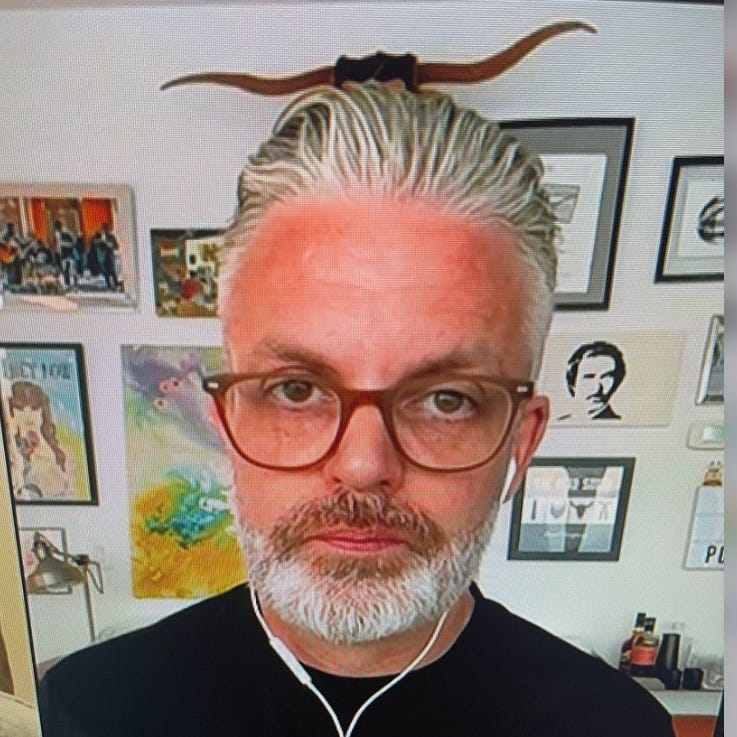
Kory Teneycke has been given a vast array of descriptors in Canadian media, but none really capture the scope of his influence, or the many hats he wears simultaneously.
Teneycke was born in 1974 and raised in rural Saskatchewan. At the tender age of 17 he worked on his first campaign, for the Progressive Conservatives during the 1991 provincial election. While working on another losing PC campaign a couple years later Teneycke met lifelong friend, Brad Wall, former Premier of Saskatchewan and advisor to the “Freedom Convoy.”
Early in his career, Teneycke already demonstrated a gift for creating controversy and harnessing that controversy for political, commercial or ideological ends. While working for Reform Party Youth in 1997, Teneycke organized a group to wear rubber Brian Mulroney masks and follow subsequent leader, Jean Charest, in order to heckle him about his connections to the unpopular former PM.
After a few years with the Saskatchewan Party, working on campaigns in 1999 and 2003, and some time spent working on energy and environment files for Mike Harris in Ontario, Teneycke was appointed head of the Canadian Renewable Fuels Association (now Renewable Industries Canada). This industry association was established as a non-profit in 1984 by a group of agricultural entrepreneurs for the purpose of creating a market for their surplus crops. Today it represents Canada’s “biofuel” producers, blenders and distributors.
In 2006, under Teneycke’s direction, the organization launched an extraordinarily successful lobbying and PR campaign, resulting in passage of C-33 in 2008. Under C-33, which took effect in 2010, federal law mandated all Canadian gasoline contain 5% “renewable” fuel. This campaign, essentially, created a brand new, profitable industry for producing, blending and distributing gas with “biofuels”. Even more importantly, C-33 was an important tool for the petroleum industry and government to greenwash Canadian oil and gas production, both domestically and internationally.
In addition to this enormous win, Teneycke also secured $2B in government “incentives” for the biofuel association members. As noted in the Globe, before leaving the association in 2007, he managed to use an Ottawa controversy over its mascot, Corncob Bob, to secure a segment on the The Daily Show with Jon Stewart. He took full-throated advantage when Bob was “banned from Canada Day” by using it as an opportunity to paint his biofuel clients as victimized in a CBC article.

During this period, Teneycke was also changing the game in terms of political communications and political direct marketing. He was critical to the successful Conservative attack on Stephane Dion’s “Green Plan'' in 2008, using targeted direct mail and web advertising to attack the proposed carbon tax before Dion’s team could even get his related communications off the ground.
Almost immediately after the successful passage of C-33, Teneyce went to work for Prime Minister Harper as Director of Communications. His appointment was meant to help mend fences between members of the former Progressive Conservative and Reform parties after the creation of the Conservative Party of Canada, as Teneycke had worked for both parties.
Though Teneycke’s stint in the PMO was relatively short lived - he was only in the position a year - he was known for pushing editors and senior journalists hard when their coverage was, in his estimation, unfavourable of the government. He regularly picked up the phone to lambast senior editors at media outlets, and their owners, and to register the Prime Minister’s personal displeasure.
Having spent a year pressuring reporters and editors, by the following summer, Kory had left the PMO to become Vice President of Sun News Network. Teneycke, unsurprisingly, had helped Quebecor lobby for and develop its upstart news network, an extension of its chain of Sun tabloids across Canada. In a Globe profile published at the time, Teneycke expanded on the network’s ideology and ambition, and his own.
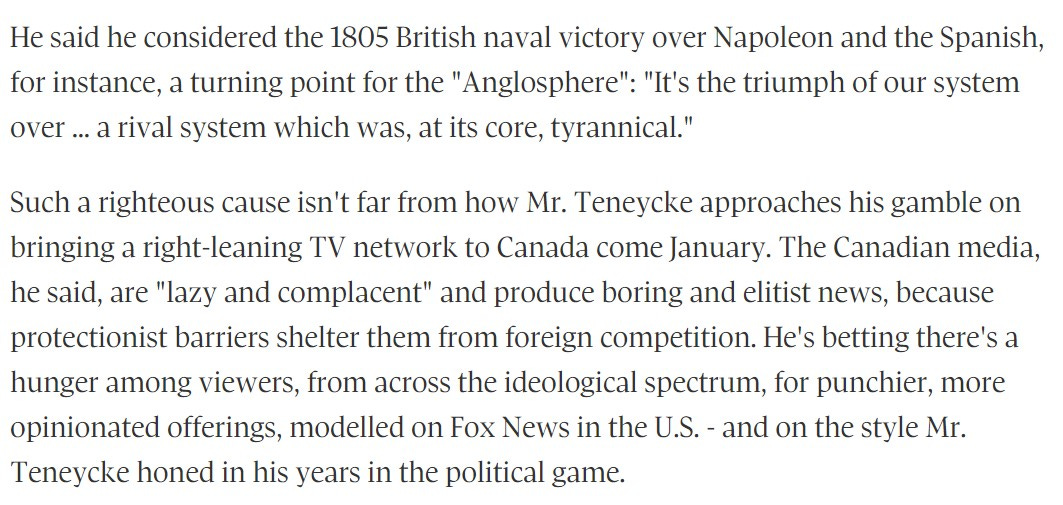
Launched in April 2011, Sun News Network ended abruptly in February 2015, having lost $47M over three years. Promoted as “unapologetically patriotic”, the venture was largely seen as an attempt by Harper and associates to establish a “Fox News of the North.”
The schedule featured, developed and promoted a who’s who of right wing pundits and agitators, such as Ezra Levant and Faith Goldy. Sun News featured David Akin and Brian Lilley as national bureau chief and senior correspondent, respectively.
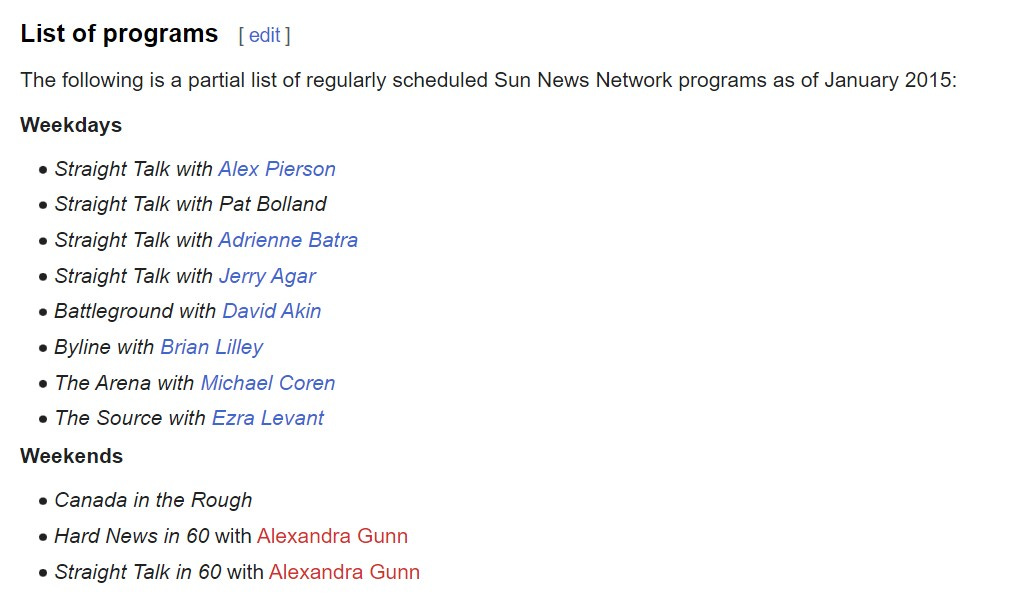
Under Teneycke’s direction, the editorial direction was aggressive and loose with the truth. In its first month, the outlet ran a report suggesting NDP leader, Jack Layton, was in attendance at a Toronto massage clinic in 1996 when police visited it on suspicions it was a brothel. At the request of Toronto Police Services, the OPP were asked to conduct a criminal breach of trust investigation into the leak of official police notes.

Sun News Network also had an ongoing preoccupation with the public broadcaster, featuring frequent and ongoing criticism of the CBC’s “left wing bias” and misuse of taxpayer money. The broadcaster and the Sun chain of papers filed hundreds of Access to Information requests, seeking details about how the public broadcaster spends its budget, culminating in a court case filed against the CBC by Canada’s Information Commissioner over the public broadcaster’s refusal to respond.

In terms of Teneycke’s leadership, Krista Erickson, the network’s lead daytime anchor from 2011 to 2013 and first “Sunshine Girl”, wrote an article for National Newswatch calling Teneycke “a controlling authoritarian” and blaming his “partisanship in overdrive” for running the weak Layton story, harming the outlet’s credibility out of the gate. Erickson also claimed that Teneycke demanded reporters not mention homophobic slurs, gaffes or anti-abortion rhetoric from Wildrose candidates in the 2012 Alberta provincial election.
In 2013, at the height of Toronto Mayor Rob Ford’s addiction and controversies, Teneycke hired Rob Ford, and then Toronto city councillor, Doug Ford, to host a weekly opinion show called Ford Nation.
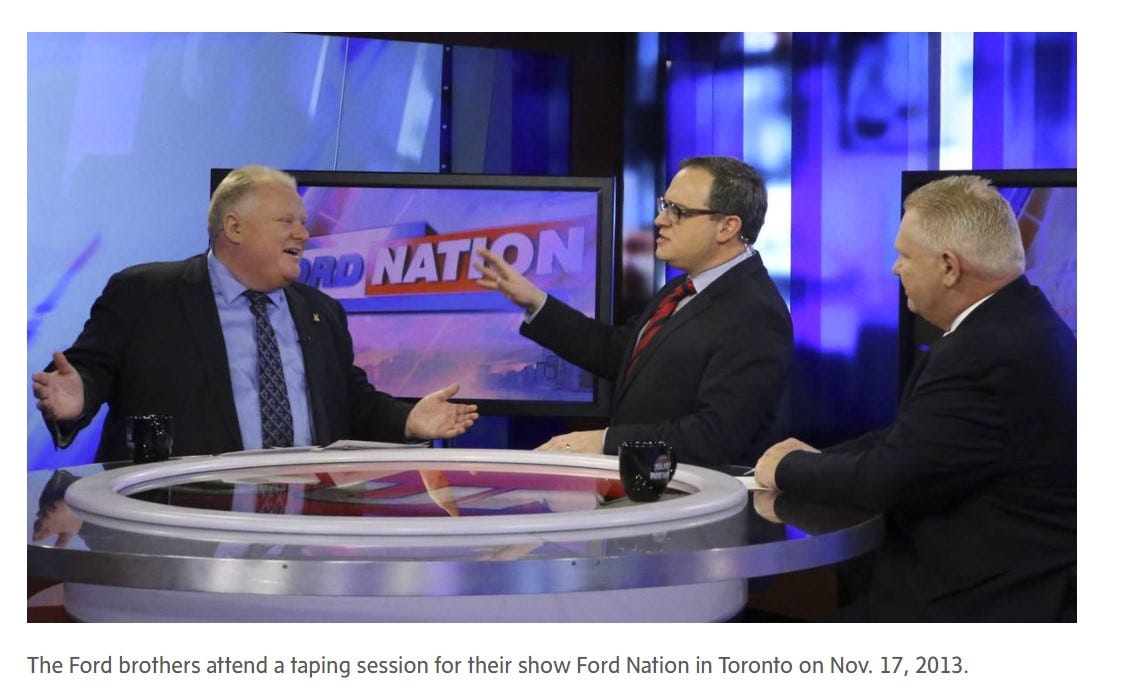
The first episode, in which the Ford brothers were quizzed by Ezra Levant and Joe Warmington, was also the last, despite delivering good ratings. The Fords’ rambling, over-talking and incorrect delivery of talking points meant the one-hour show required five hours to tape and eight hours to edit, making it infeasible to continue.

When Sun News Network ended, Teneycke rejoined Harper’s federal Conservative Party, serving as its chief spokesperson for the fall 2015 federal election. But his passion for the influence of broadcasting did not wane. For a time he had his own radio show on Toronto’s AM640 called “The Kory Show”, but his media platform has grown considerably since his involvement with the election of Doug Ford as premier of Ontario in 2018.
Teneycke is frequently featured on Canadian news outlets as a pundit and commentator, under the pretense of being a “political strategist”, a title that serves to obscure his role as owner of a lobbying firm and highly successful influence peddler for his commercial and government clients and the Ford government itself.

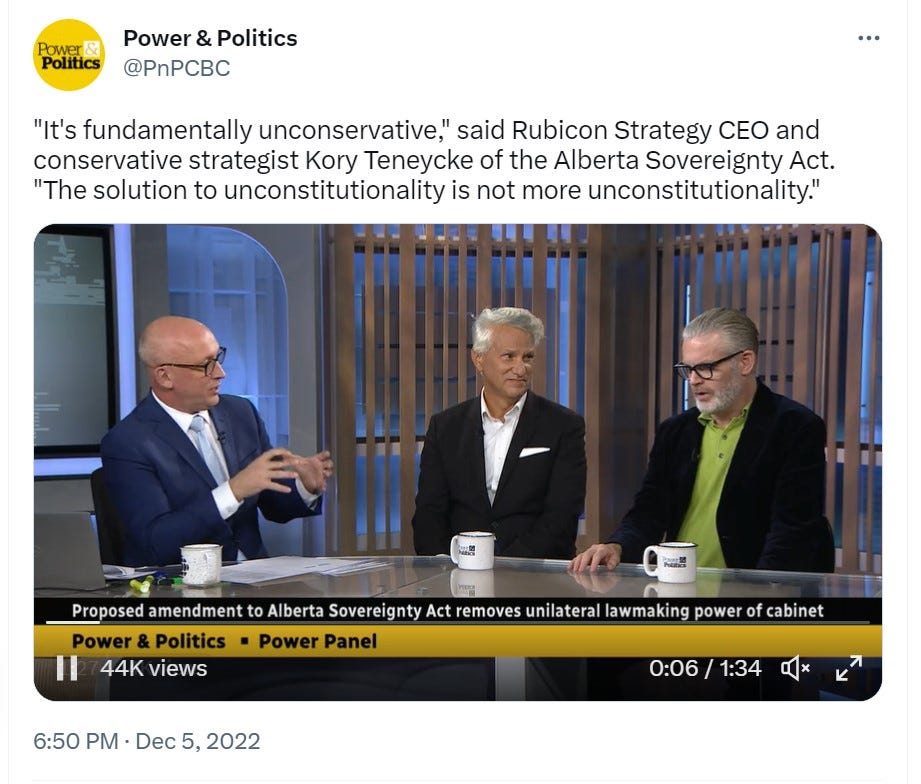
In June 2018, just twenty days after helping to install Doug Ford as Premier, Teneycke incorporated Rubicon Strategies. The omnipresent firm markets itself as offering government relations, digital marketing, and communications. The Globe and Mail reported Teneycke was pitching his services to Hydro One within days of the election.
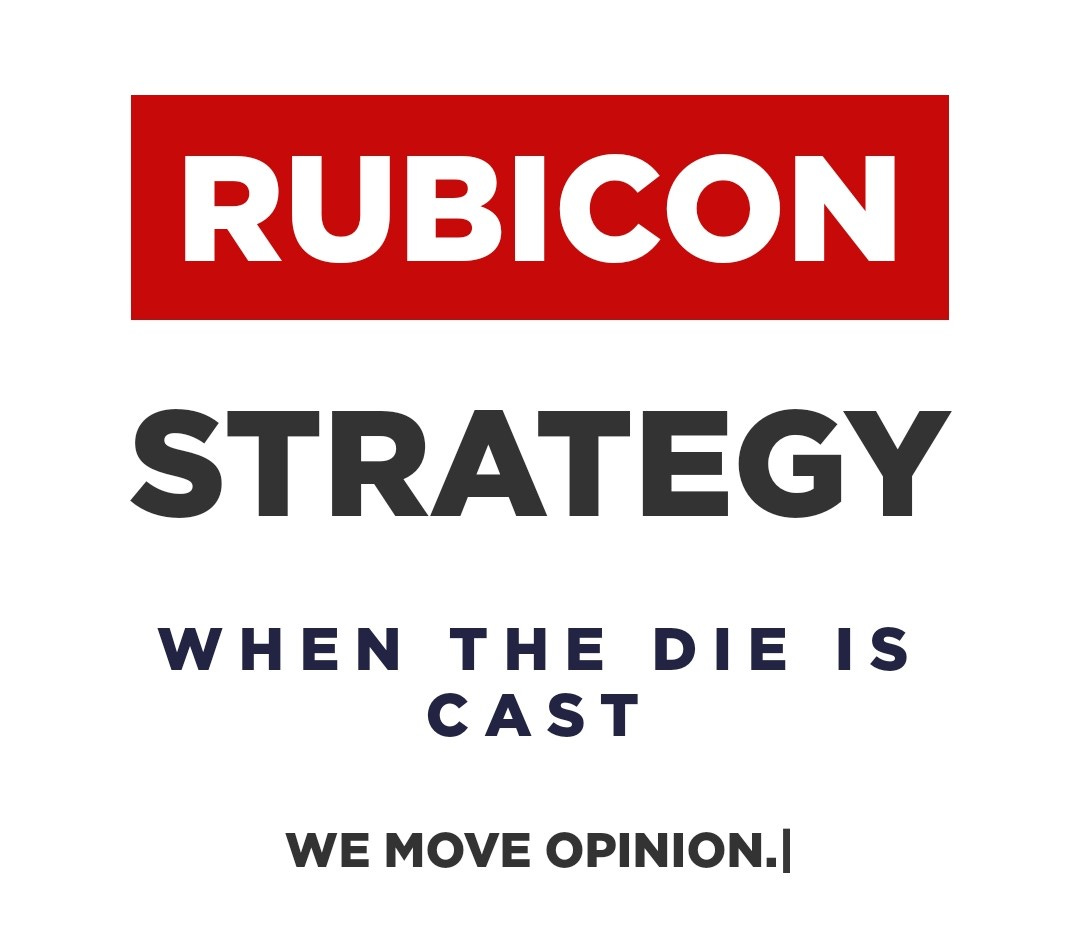
Rubicon has a division (Rubicon Defense) which bills itself as a “premier aerospace and defense consulting group comprised of battle-hardened experts in the areas of Canadian federal procurement with a focus on policies, procedures and the detailed requirements of military acquisitions.” Another Rubicon division offers “strategic advice” on ESG, which it describes as Environment, Social and Governance, to “drive continuous improvement and investor confidence.”
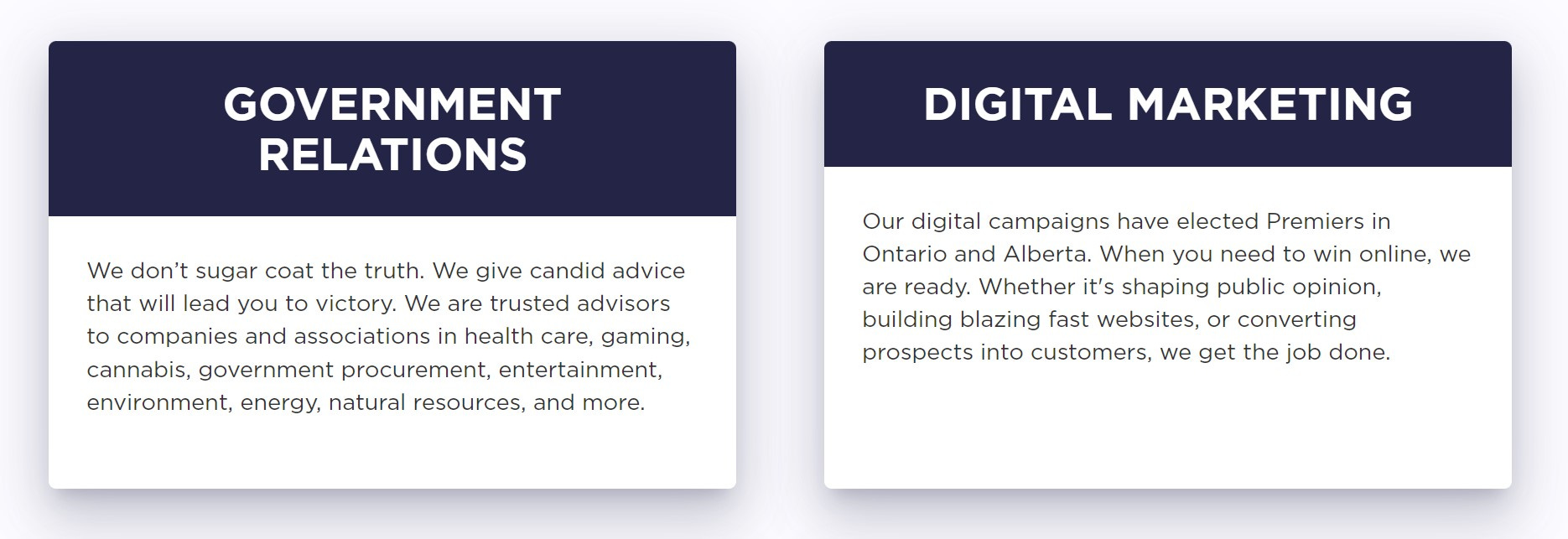
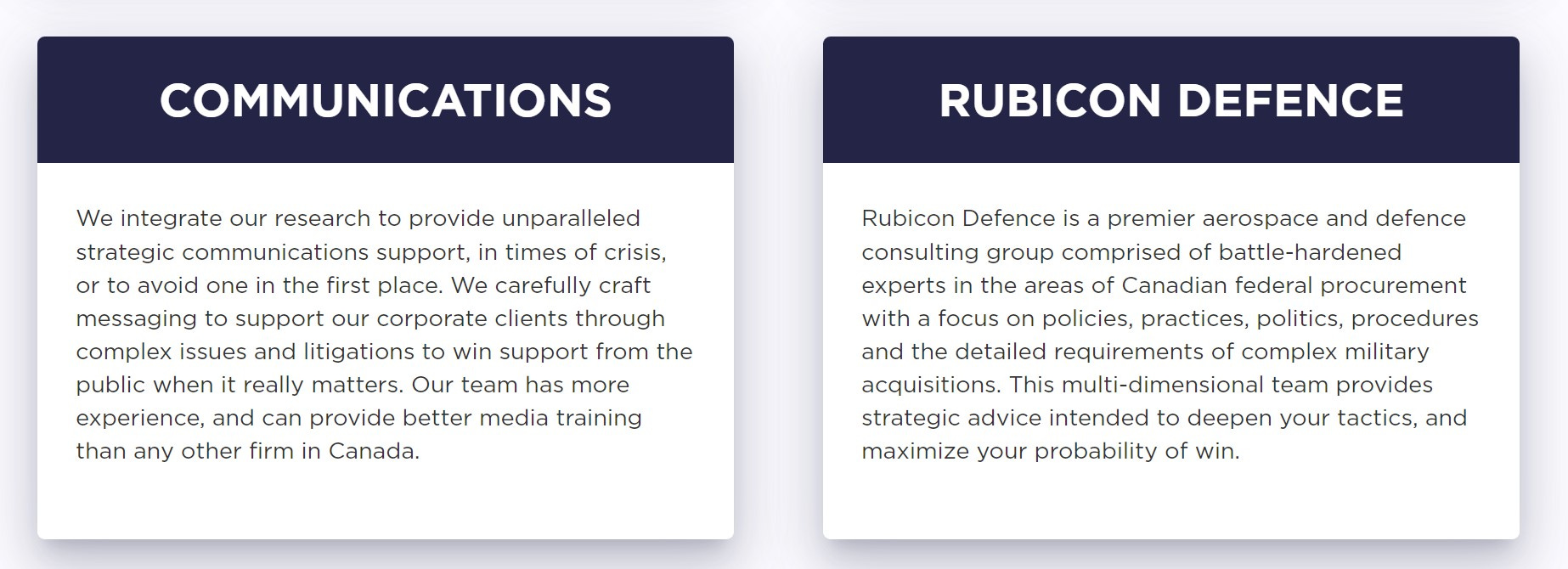
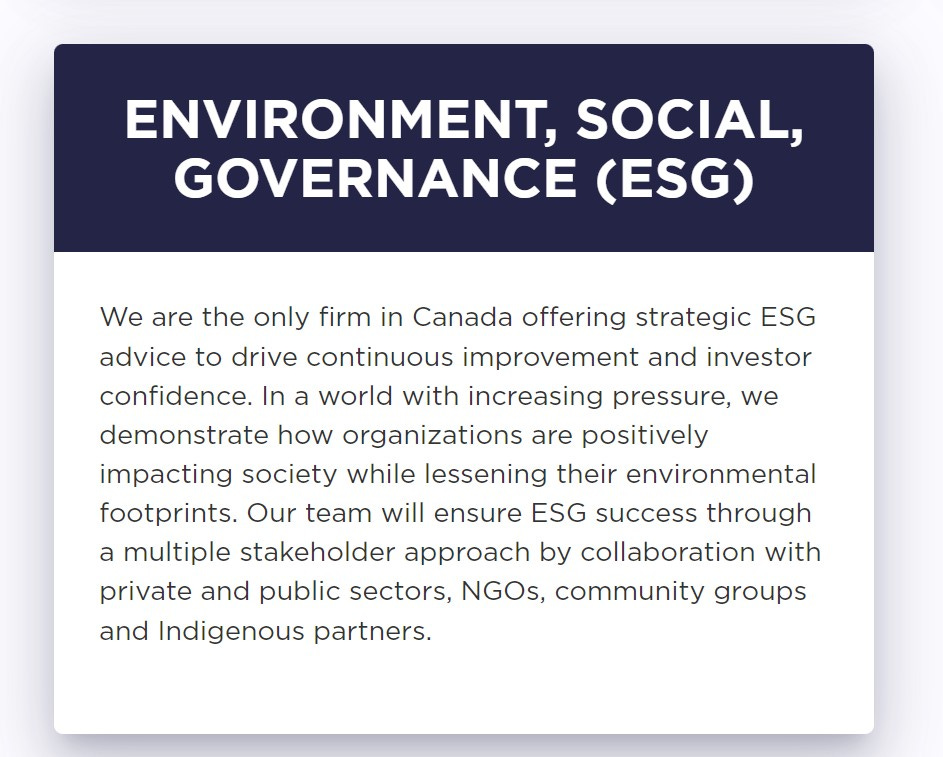
A more recent addition to the Rubicon empire has been Rubicon Strategic Healthcare, under the leadership of Mark Vandenberg. It bills itself as offering “leading Canadian and US pharmaceutical and biotechnology companies” strategic planning, business development and marketing.
The three men widely regarded as responsible for Ford’s election - Teneycke, Chris Froggatt and Dean French - often referred to their partnership during the election as a “three-legged stool”. Froggatt opened his own “strategy firm” (called Loyalist Public Affairs) a month after Teneycke incorporated Rubicon, also offering “government relations services”. French became Ford’s Chief of Staff.
Post-election, the men formed their three-legged stool again, effectively becoming open channels between the Ford government and the corporations, individuals and interests represented by Rubicon and Loyalist. A variety of other colleagues and associates opened similar “strategy” firms or took lobbying roles during the post-election period, including Frank Klees, Peter Van Loan, Melissa Lantsman, Melanie Paradis, Tim Hudak, and Amir Remtulla, former chief of staff for Rob Ford, who registered to lobby for 17 clients, mostly developers.
The relationships of Rubicon are very interconnected and usually opaque.
- Teneycke’s partner at Rubicon, Michael Coates, served on Doug Ford’s transition team.
- John Tory’s most recent mayoral campaign was run by Patrick Harris, Rubicon’s managing partner. (A complaint was lodged with the integrity commissioner against Tory’s campaign for its use of robocalls on election day.)
- Rubicon also lobbies for Torstar, parent company of the Toronto Star.
- Kory himself is an advisor to Brad Bradford’s mayoral campaign.
- Elizabeth Roscoe, Rubicon’s senior vice president of public affairs, is a member of the Institute for Research on Public Policy.
- Don Newman, who covered politics for the CBC for decades, is Rubicon’s executive vice president.
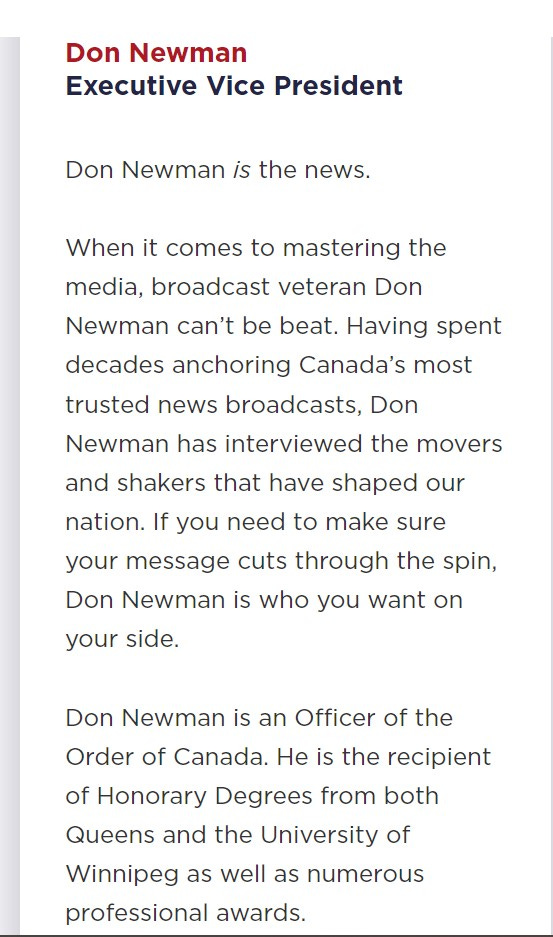
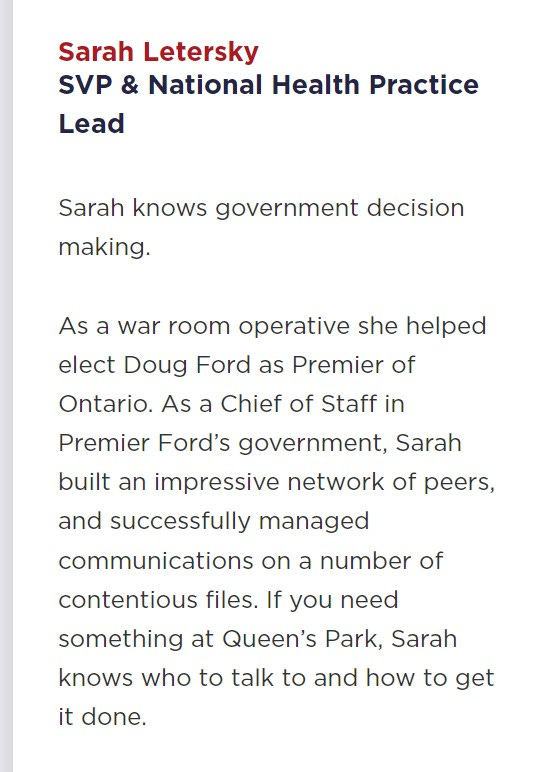
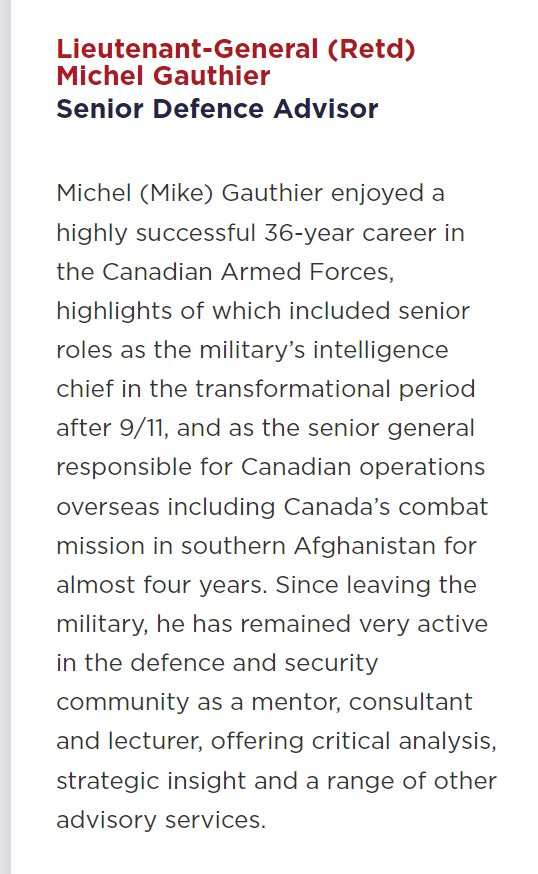
By December of 2020, not six months after Ford’s election, Democracy Watch was already warning that Ontario’s Integrity Commissioner, David Wake, was allowing lobbyists to violate the province’s lobbying law. The fourteen page letter describes many individuals affiliated with Ford it believed to be in violation, including eight employees of Rubicon.
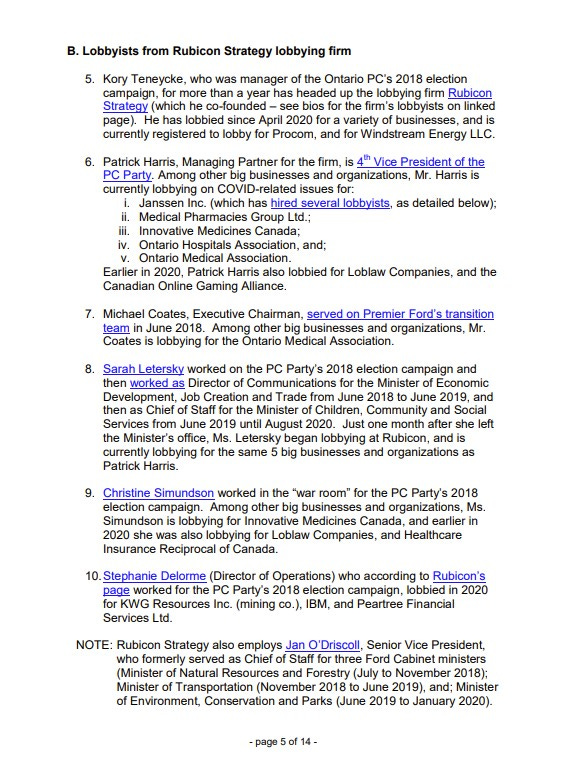
While “government relations” (typically defined as helping companies do business with the government) has been a feature of the Canadian corporate world for decades, these channels essentially create a porous relationship between companies and the government that works in both directions. While it’s understood companies lobby the government in order to have legislation written in their favour, Teneycke’s company creates opportunities for companies to aid and support government initiatives in exchange for legislative favours.
Among Rubicon’s clients is an organization called Innovative Medicines in Canada. Representing 49 pharmaceutical companies and interests, the group bills itself as advocating for “the discovery, development and delivery of innovative medicines and vaccines to improve the lives of all Canadians.” Andrew Balfour of Rubicon is their registered lobbyist.



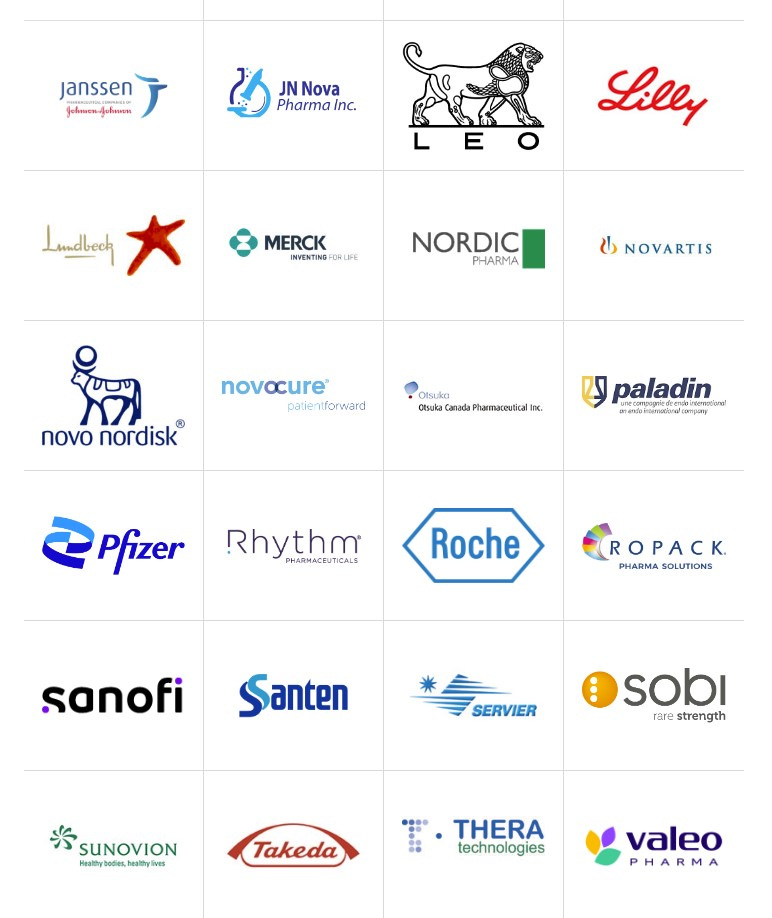
Included among the members of Innovative Medicines are the makers of virtually all over-the-counter cold and flu medicines, as well as vaccines for COVID and other infectious diseases.
In 2022, Canadian provinces (particularly Ontario and Albert) faced a shortage of common cold and pain medications. While countries around the world faced the symptomatic realities of COVID just as Canada did, the shortage here was unique, and received heavy play on media and social media. Conservative politicians and media aggressively pinned the shortage on federal mismanagement in Ottawa. (Rather coincidentally, political operative Melanie Paradis was personally affected and she and her child were featured prominently in a National Post article about needing to travel to the US to get over-the-counter medicine for her child.)
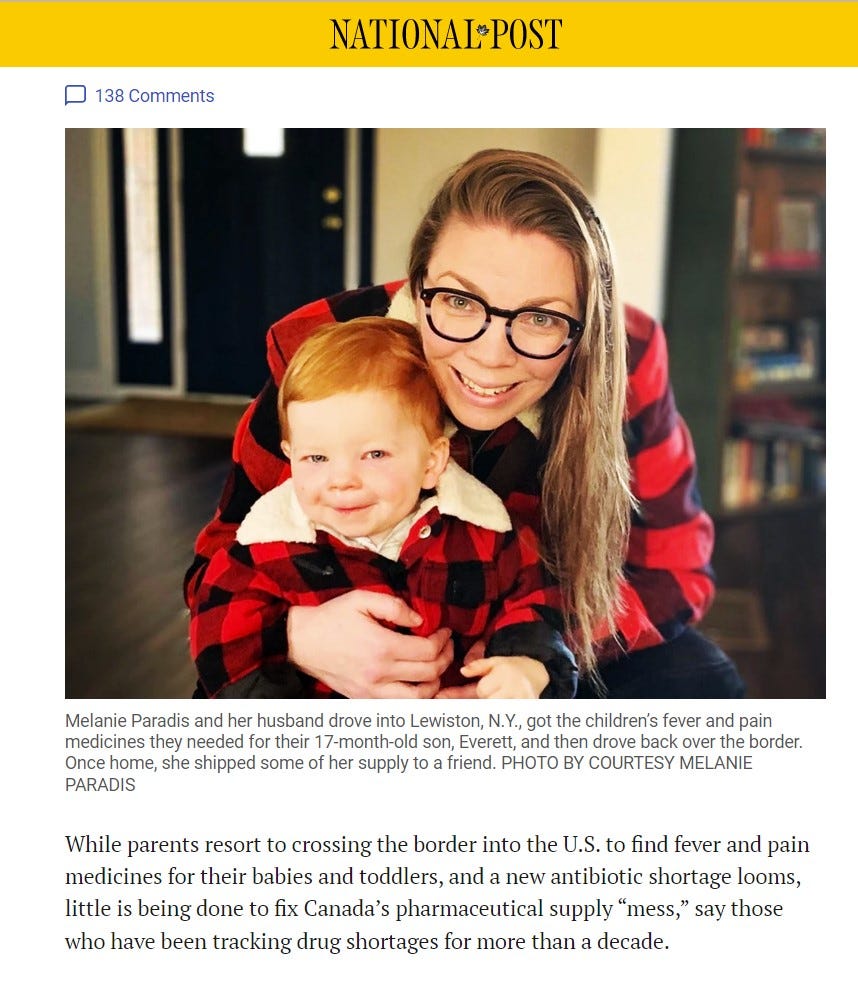
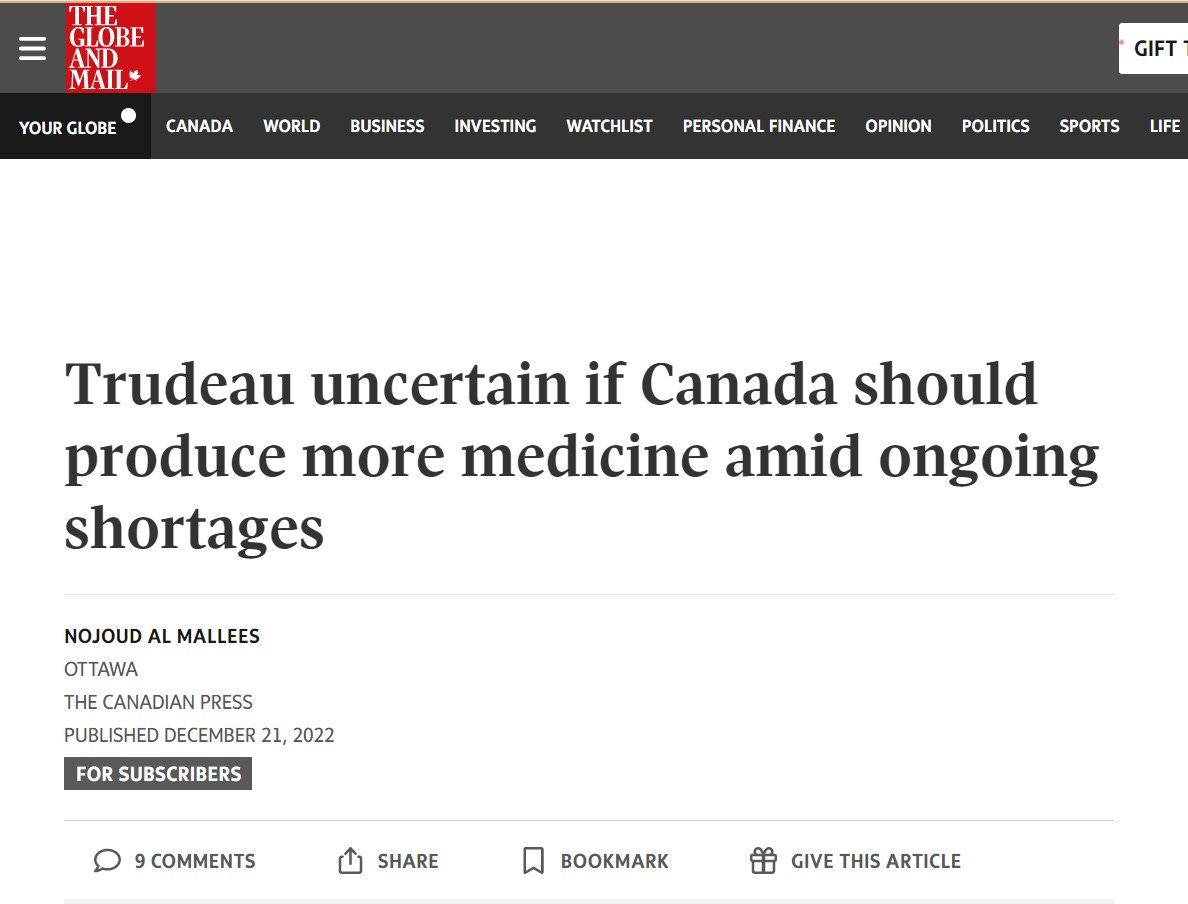

The conservative party in Alberta used the shortage to full political advantage. In addition to generating weeks of headlines about the shortage, Danielle’s Smith government used the shortage as pretense to purchase $80M of cold and flu medicine from Atabay Pharmaceuticals in Turkey, positioning the provincial government itself as a dealmaker to the rescue.

Atabay is closely aligned to the Erdogan government in Turkey, and is owned by the mother and uncle of TV doctor and Republican candidate, Dr. Oz. The medicine was bought and imported without Health Canada approval and was determined to be, on arrival in 2023, of a different concentration than products sold in Canada.
When Alberta pharmacies declined to sell the products, due to the “education requirements” for parents to dose their children properly, the shipment was provided to Alberta hospitals for their use.
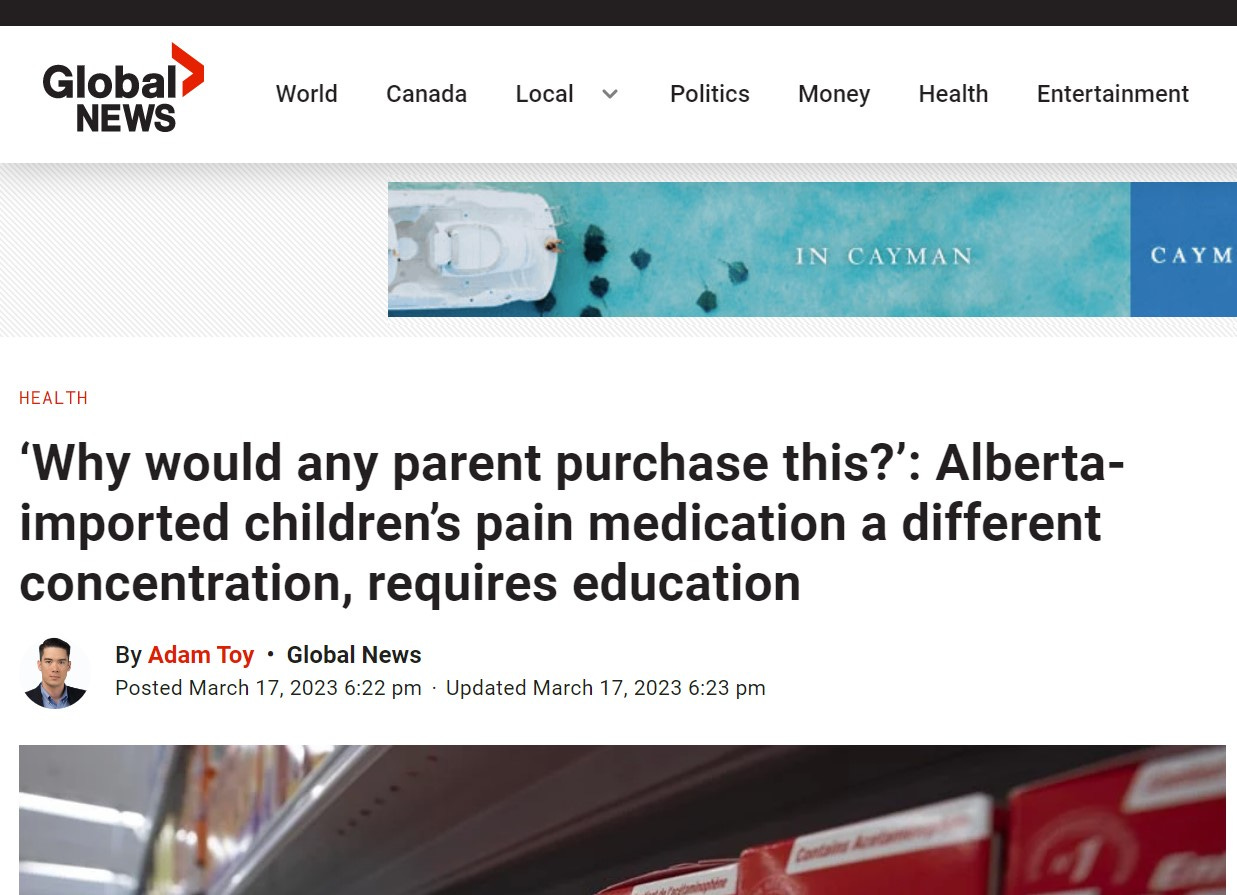
As of May 2023, parents of children in Alberta hospitals were being recommended to bring their own pain and fever medicines because children are “unable to tolerate” the Turkish medicines.
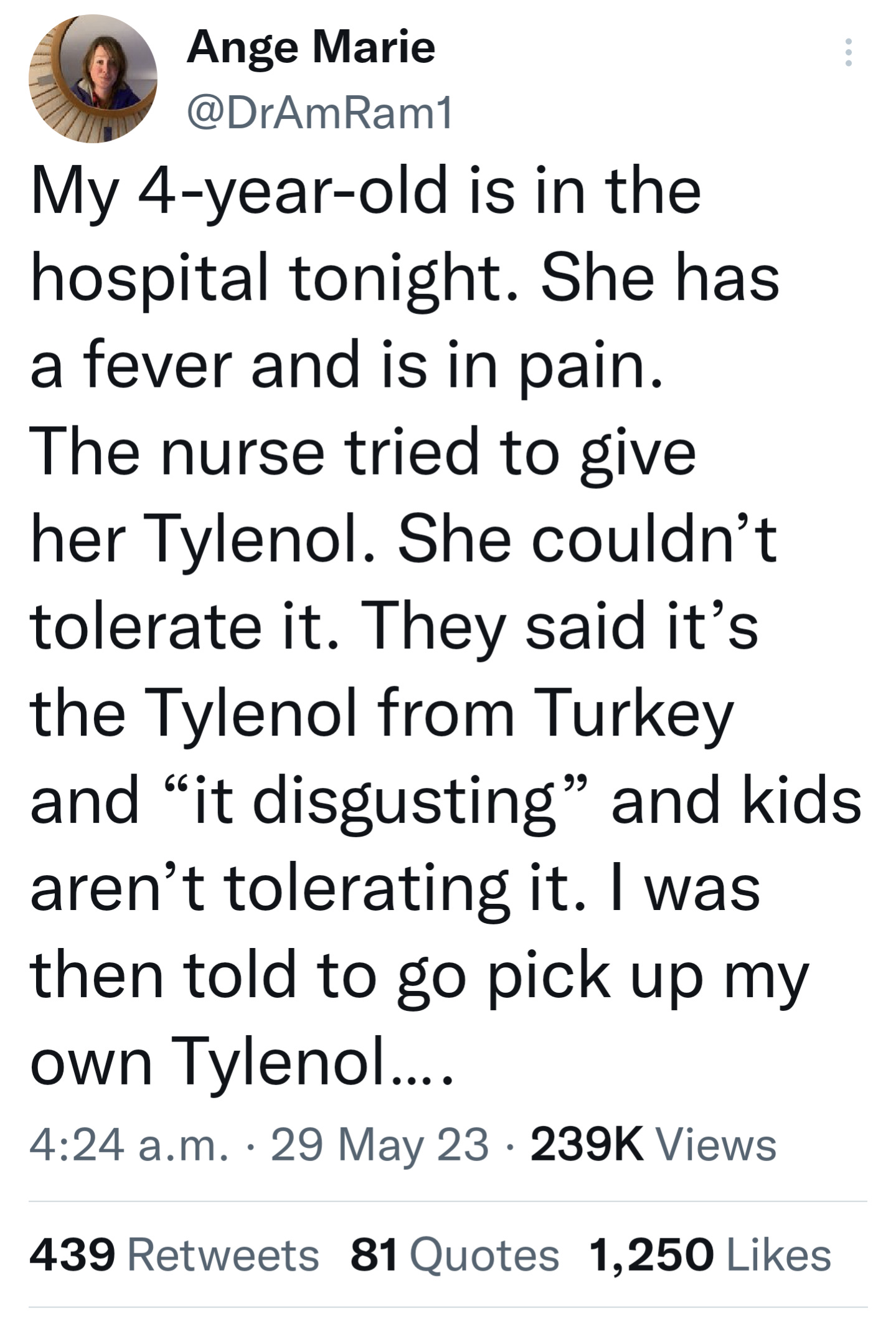
Indeed, the business interests of Rubicon’s clients have caused stir even in conservative circles, and created fractures amongst ideological and political allies. In December of 2021, Teneycke and Rubicon sued former Doug Ford ally, evangelist Charles McVety, over his allegations that the “real reason” for vaccine requirements in Ontario was due to lobbying by Rubicon on behalf of AstraZeneca and Innovative Medicines Canada.
Under the direction of Teneycke’s Rubicon, Innovative Medicines also seems to have beneficially influenced federal Health Minister, Jean-Yves Duclos. In recent reporting for The Breach, Kelly Crowe writes that letters obtained through access to information requests show that Duclos intervened with Canada’s “arm’s length” drug regulator on behalf of the pharmaceutical industry, specifically after being lobbied by Innovative Medicines.
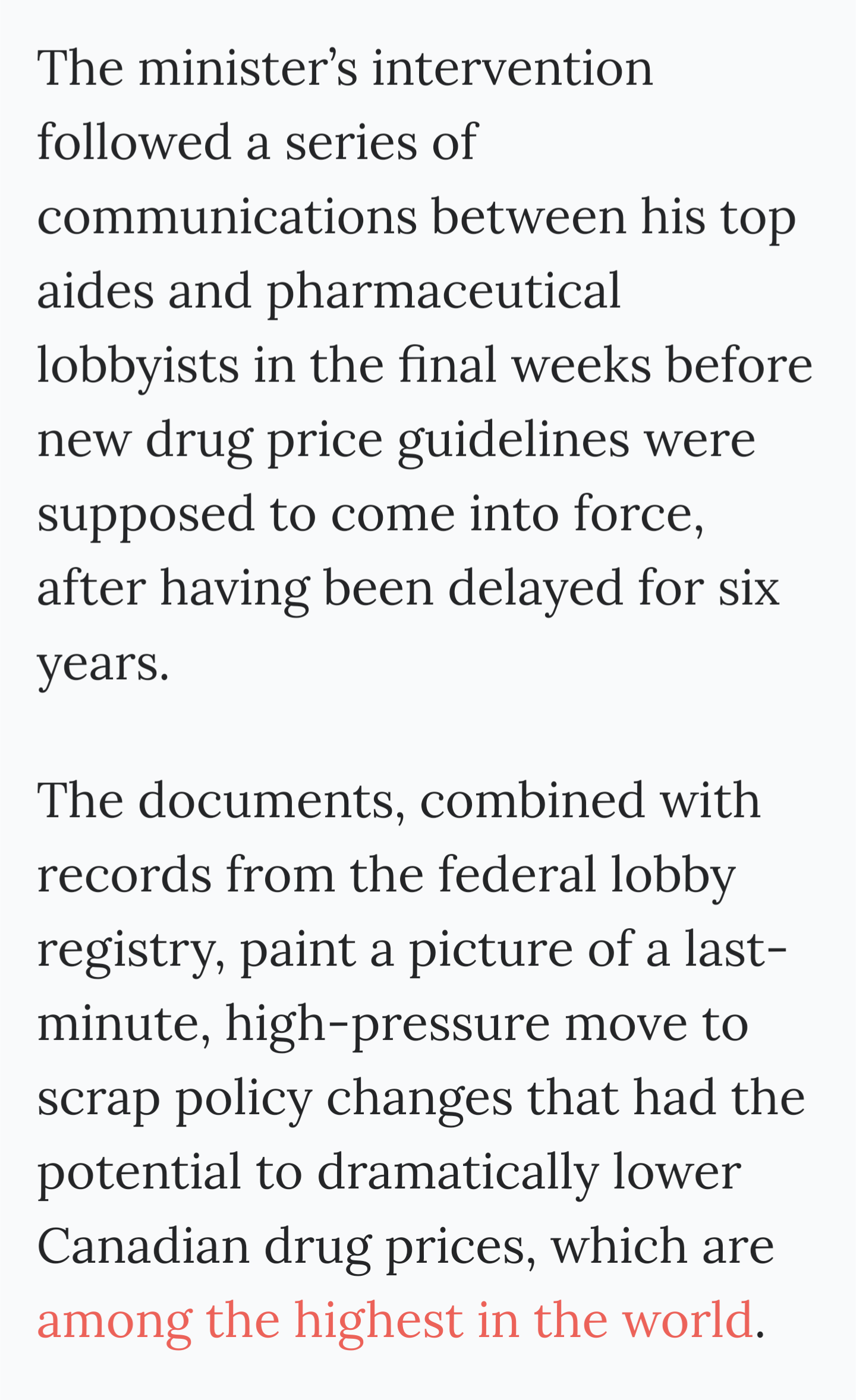
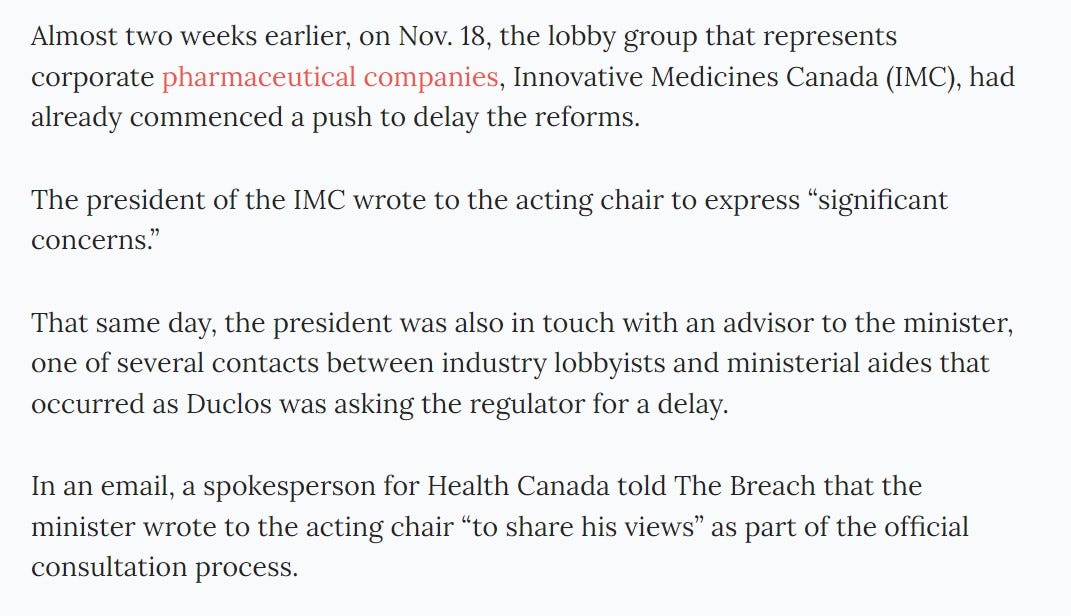
The chair of the arm’s length regulator resigned after reminding Duclos in writing of the organization’s independence. Ultimately the reforms, which would limit what pharmaceutical companies could charge, were successfully delayed.
Another win for Kory and his clients.
Corruptario by Jordan Roberts & Friends is a reader-supported publication. To receive new posts and support my work, consider becoming a free or paid subscriber.
